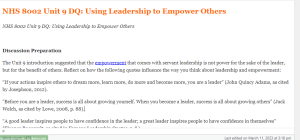NHS 8002 Unit 9 DQ: Using Leadership to Empower Others
NHS 8002 Unit 9 DQ Using Leadership to Empower Others
Discussion Preparation
The Unit 9 introduction suggested that the empowerment that comes with servant leadership is not power for the sake of the leader, but for the benefit of others. Reflect on how the following quotes influence the way you think about leadership and empowerment:
“If your actions inspire others to dream more, learn more, do more and become more, you are a leader” (John Quincy Adams, as cited by Josephson, 2012).
“Before you are a leader, success is all about growing yourself. When you become a leader, success is all about growing others” (Jack Welch, as cited by Lowe, 2008, p. 88).
“A good leader inspires people to have confidence in the leader; a great leader inspires people to have confidence in themselves” (Eleanor Roosevelt, as cited in Famous Leadership Quotes, n.d.).
“You have to look at leadership through the eyes of the followers and you have to live the message. What I have learned is that people become motivated when you guide them to the source of their own power and when you make heroes out of employees who personify what you want to see in the organization” (Anita Roddick, 1991).
“A leader … is like a shepherd. He stays behind the flock, letting the most nimble go out ahead, whereupon the others follow, not realizing that all along they are being directed from behind” (Nelson Mandela, 2000).
Instructions

In your initial discussion post, address the following questions:
Which quote really spoke to you, and how might it influence the way you view the leadership, power, and authority with which you have been entrusted?
How could it help guide and shape your personal leadership style?
How might you use these approaches to effect change in health care as a leader?
How might these quotes, plus your readings on servant leadership, help you create a culture where diversity, ethics, and inclusion are valued?
Remember that anytime you use a resource to support your statements, you must follow APA guidelines for citations and references.
Response Guidelines
Read as many posts as time allows. Please choose posts that have had few responses thus far and refer to the Faculty Expectations for Response Guidelines. Use this discussion to gain a deeper understanding of the different ways and reasons people become leaders.
NHS 8002 Unit 9 DQ Using Leadership to Empower Others References
Josephson, M. (2011). More business & leadership quotes [Blog post]. Retrieved from http://business.josephsoninstitute.org/blog/2011/02/06/more-business-leadership-quotes/
Leadership-Central.(n.d.). Famous leadership quotes. Retrieved from http://www.leadership-central.com/famous-leadershipquotes.html#axzz4MiYcVMGL
Lowe, J. (2008). Jack Welch speaks. Hoboken, NJ: Wiley.
Mandela, N. R. (2000). Long walk to freedom: The autobiography of Nelson Mandela. Boston, MA: Little, Brown.
Roddick, A. (1991). Body and soul: Profits with principles, t
NHS 8002 Unit 9 DQ Using Leadership to Empower Others Grading Rubric Guidelines
| Performance Category | 10 | 9 | 8 | 4 | 0 |
| Scholarliness
Demonstrates achievement of scholarly inquiry for professional and academic decisions. |
|
|
|
|
|
| Performance Category | 10 | 9 | 8 | 4 | 0 |
| Application of Course Knowledge –
Demonstrate the ability to analyze, synthesize, and/or apply principles and concepts learned in the course lesson and outside readings and relate them to real-life professional situations |
|
|
|
|
|
| Performance Category | 5 | 4 | 3 | 2 | 0 |
| Interactive Dialogue
Replies to each graded thread topic posted by the course instructor, by Wednesday, 11:59 p.m. MT, of each week, and posts a minimum of two times in each graded thread, on separate days. (5 points possible per graded thread) |
|
Summarizes what was learned from the lesson, readings, and other student posts for the week. |
|
|
|
| Minus 1 Point | Minus 2 Point | Minus 3 Point | Minus 4 Point | Minus 5 Point | |
| Grammar, Syntax, APA
Note: if there are only a few errors in these criteria, please note this for the student in as an area for improvement. If the student does not make the needed corrections in upcoming weeks, then points should be deducted. Points deducted for improper grammar, syntax and APA style of writing. The source of information is the APA Manual 6th Edition |
|
|
|
|
|
| 0 points lost | -5 points lost | ||||
| Total Participation Requirements
per discussion thread |
The student answers the threaded discussion question or topic on one day and posts a second response on another day. | The student does not meet the minimum requirement of two postings on two different days | |||
| Early Participation Requirement
per discussion thread |
The student must provide a substantive answer to the graded discussion question(s) or topic(s), posted by the course instructor (not a response to a peer), by Wednesday, 11:59 p.m. MT of each week. | The student does not meet the requirement of a substantive response to the stated question or topic by Wednesday at 11:59 pm MT. |

